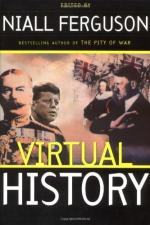|
This section contains 6,744 words (approx. 23 pages at 300 words per page) |

|
SOURCE: “Historiographical Counterfactuals and Historical Contingency,” in History and Theory, Vol. 38, No. 2, 1999, pp. 264-76.
In the following review, Tucker examines the methodology and merits of “alternative history” and offers an analysis of Virtual History.
“Alternative history” is an established genre of literature that is sometimes classified as science fiction. Hundreds of books explore what would have happened had, for example, Hitler never been born, or won the war. Recently, grassroots non-academic interest in this genre has surged. A yearly “Sidewise Award” is given for the best alternative history book and short story. An internet site, “Uchrania: The Alternative History List,” is devoted to a comprehensive annotated bibliography of works of alternative history in all genres in all languages (http://www.skatecity.com/ah/). Thus far, most academic historians have pretended to ignore this genre. Virtual History is significant in contributing to breaking the academic taboo on explicit discussions...
|
This section contains 6,744 words (approx. 23 pages at 300 words per page) |

|


